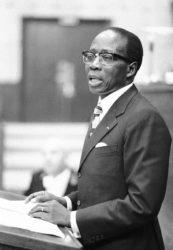 Around the time when African colonies began to gain independence from European colonial powers, African literature was born. It is neither ironic nor strange that it was born in Europe. It developed gradually out of political movements, out of the exile of African and Caribbean writers in Europe, and out of the escalation of the publication of the works of African writers in French and in English.
Around the time when African colonies began to gain independence from European colonial powers, African literature was born. It is neither ironic nor strange that it was born in Europe. It developed gradually out of political movements, out of the exile of African and Caribbean writers in Europe, and out of the escalation of the publication of the works of African writers in French and in English.
What is worth emphasizing is that it happened centuries after indigenous African literature had been in existence and flourishing in the various kingdoms and nations in the African continent that became colonies of Britain, France, Belgium, Holland, Portugal and others. This was the very strong corpus of work in African oral literature, which was the lifeblood of their spiritual practice, religious beliefs, traditional social institutions, rites of passage, entertainment and the transmission of their wisdom and history.
The African literature, then, that developed in the 1950s and gained ground rapidly in the 1960s was the work of the continent’s writers in English and in French – the discovery by Europe that this vast store of literature existed, that they then began to disseminate around the world. What is the real irony is that those seemingly very colonial beginnings included a major counter-reaction to colonialism, and were the catalyst to the liberation of the literature, to decolonisation and the creation of its contribution to contemporary post-colonial literature.

It started in Paris in the 1930s to 1940s with the ‘Negritude Movement’ led by Leopold Sedar Senghor, Aime Cesaire and Leon Damas. It was an intellectual movement among black writers in France who began to advocate a strong philosophical position based on their place as an ethnic minority from the colonies whose thought and writing had a particular identity informed by their cultural, racial and political existence. Negritude literature emerged, mainly among poets.
It is of interest that two of the ‘founders’ were Caribbean men – Cesaire from Martinique and Damas from French Guiana. Other Africans were soon a part of it, including Birago Diop (Senegal), Dennis Brutus (Rhodesia/South Africa) among others. What is of further interest is that they went on to become major leading politicians as well as literary figures on returning to their various homes.
Others became associated with it almost a generation afterwards, most prominent among them being the Nigerian dramatist, poet, novelist, academic Wole Soyinka (first black Nobel Prize Winner 1986). Soyinka was also among those involved in the rise of African literature in English. Other poets included – in French – David Diop (Senegal), and in English – J P (John Pepper) Clarke (Nigeria) and Kofi Awooner (Ghana). The foremost novelists responsible for the rise of this literature included the Nigerians Chinua Achebe and Amos Tutuola.
The playwrights were mainly Soyinka and Ama Ata Aidoo of Ghana, the first woman in the vanguard group, who, surprisingly, has remained outstanding, joined later by Bessie Head (South Africa). For a useful coverage of some major women in that company, see Adeola James’ In Their Own Voices: African Women Writers Talk.
Soyinka anthologised several of the poets in 1975 in Poems of Black Africa (Heinemann), including Senghor (1906 – 2001), a founding leader in the Negritude movement and instrumental in the rise of African literature. He studied, lived and worked in France for many years, fighting for that country in the great war and leading the intellectual charge in Paris. After returning home to Senegal he became the President of that nation, whose independence from France he engineered.
His poem reproduced here is untitled. “Khalam” is the name of an Islamic philosophy, but it is not so used in the poem. The same word “khalam” is also known as an African musical instrument – much like a lute. This work is a love song to be performed to the music of the khalam. On the surface it could be addressed to a woman, but it is soon clear that it is patriotic, a poem of exile and nostalgia for country. Knowing the context of so much of Senghor’s work, it is post-colonial in quality, and refers to Senegal in that context.
There are poems of similar nature by the likes of J P Clarke, Brutus and Diop who also have seeming love poems with the same reference to country and national liberation. The works of these poets actually accompanied political liberation and independence. That is reflected even in the personal ideology of the poets. Kofi Awooner, for example, started out publishing under his real (original) name of Awooner Williams. As his career progressed he changed it to Kofi Awooner Williams, and then dropped the Williams altogether. That was clearly symbolic of his shedding his English (colonial) name to root himself more soundly in his African identity.
While this kind of growth and transition was taking place in the literature published in English, the traditional oral literature remained rooted. “The Fulani Creation Story” is an example of the corpus of creation myths in West Africa. Not unlike the West African speech acts, tales and oral literature, it carries a lesson in morality, as we see pride being punished and an explanation provided for the nature of the present cosmos inhabited by man.









